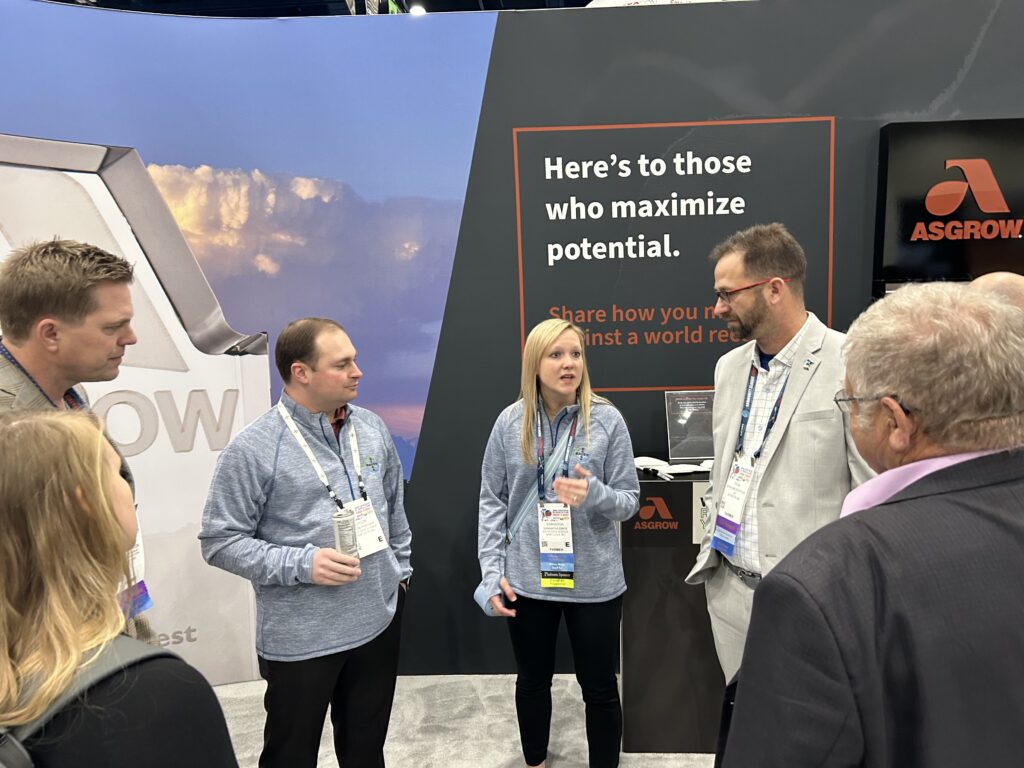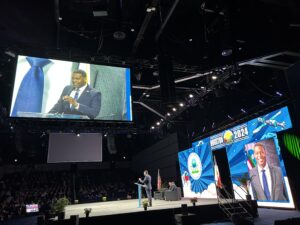Apparently, the adage is true: Everything really is bigger in Texas.
For the second consecutive year, Commodity Classic, the nation’s largest agriculture conference and trade show, posted record attendance. More than 11,000 farm families, industry professionals and advocates gathered in Houston, Texas, to get an up-close look at farming innovations, attend breakout sessions, walk to levels of a sold-out trade show, hear from federal officials while squeezing in time for networking.
“It was another great Classic,” said Minnesota farmer George Goblish, who represents the American Soybean Association (ASA) on the Commodity Classic Planning Committee. “I’ve heard nothing but positive feedback from attendees. The trade show was full, and I think we did a good job of offering plenty of learning and networking opportunities.”
The 2024 Classic was Goblish’s fourth and final year on the planning committee. He said he’s pleased to see the growth Commodity Classic has made since 2021, Goblish’s first year on the committee. That year, the pandemic forced organizers to a hold a virtual event.
“We’ve definitely come a long way since then,” he said. “After the virtual year, I don’t think we’ll ever take for granted meeting in person.”
For the Minnesota Soybean Growers Association (MSGA), Commodity Classic centers around gathering with ASA’s 25 other state affiliates to finalize policy resolutions for the year ahead. Following a joint state caucus earlier in the week, more than 20 Minnesota delegates joined their national peers in approving ASA’s policy resolutions on federal issues including water quality, eminent domain, biofuels, agriculture research, crop insurance and more.
“This is always an important process, and one that moves much more efficiently,” President Bob Worths said.
Classic also allows MSGA the opportunity to visit with industry partners. This year, directors met with Bayer, Beck’s and Corteva leaders to discuss crop protection issues and future collaborations.

“These meetings are very important steps in building relationships with our supporters,” said MSGA Director Bob Lindeman, who serves on MSGA’s industry relations committee. “As an organization, sponsorship from industry is crucial to sustaining our work in St. Paul and D.C., and we enjoy the opportunity to visit and thank them for their ongoing support.”
On behalf of MSGA, Worth hosted more than a dozen state association presidents in MSGA’s meeting room.
“It was an impressive turnout,” Worth said. “We had a good discussion, got know each other and talk about issues in our state.”
Showtime
During Friday’s General Session, USDA Secretary Tom Vilsack said the department would need a few more weeks –”not months” – to outline guidance for the GREET model for sustainable aviation fuel.
“We’re measuring once and cutting twice. We want to make sure the latest and best information is utilized in the modeling that will inform the Treasury. while formulating the guidance,” Vilsack said. “I wanted to make sure that biofuels — ethanol and biodiesel — and the feedstocks that provide those fuels have the ability to qualify for the tax credits. That is particularly true of those feedstocks that are generated through climate smart practices — no-till, cover crops, energy efficient fertilizer — the things that you are already using in the field to produce a wide array of the commodities that you raise.”
Vilsack added that he expects farmers will help produce about 95% of sustainable fuel within the next 20 years. In addition, he said the Biden administration is on pace to reach its goal of producing by 3 billion gallons of SAF by 2030.
“Not everyone in the country appreciates the level to which farmers have embraced sustainable farm practices,” he said. “So, it’s incumbent upon us at USDA to be your voice in these inner-agency meetings to make sure our colleagues and other departments who focus on this on a daily basis are aware.”
The secretary also highlighted the administration’s efforts to increase domestic production of fertilizer.

“We are cognizant of the challenges you face there,” he said. “To date, we’ve funded 40 projects in 25 states to expand access to fertilizer supply and to also create alternates to provide the technology to help farmers better understand what needs to be fertilizer and how much.”
In addition to Vilsack, EPA Administrator Michael Regan also delivered an address. His appearance marked the first time the head of EPA has attended Commodity Classic. During his remarks, Regan announced he was creating an Office of Agriculture and Rural Affairs to be led by Agriculture Advisor Rod Snyder.
“We will ensure ag and rural stakeholders will have a seat at the table,’ said Regan, a North Carolina native.”
During his remarks at the General Session, Josh Gackle, a North Dakota farmer who serves as ASA president, said advocacy groups appreciated meeting with Administrator Regan and encouraged USDA to continue including biofuels as part of the sustainable fuels market.
“The future is bright,” Gackle said. “There’s a great opportunity and we’re excited about it,”
Gackle also said ASA will continue defending the soy checkoff against legislation that would severely limit the national checkoff program, which has helped propel farmer profitability for more than 30 years. Today, for every dollar farmers pay into the checkoff, growers earn $12.34 in return value.
“(The checkoff) goes into building demand for our products across the world,” he said. “It’s not something I can do individually to get that type of ROI. It’s a tool we can use to invest back in our farms and invest back in rural America, keeping our farms vibrant.”
The 2025 Commodity Classic will be held March 2-4, 2025, in Denver, Colo.
“Houston set a high standard for Commodity Classic,” Goblish said, “but we seem to keep raising the bar.”




